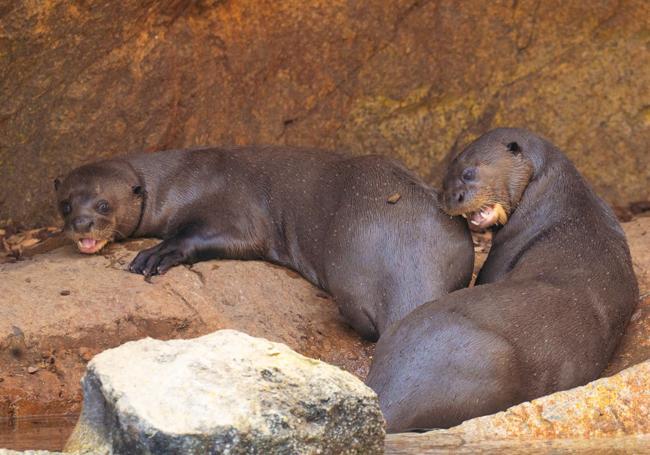-kaCF--1200x840@Diario%20Sur.jpg)
-kaCF--1200x840@Diario%20Sur.jpg)
Sections
Highlight
-kaCF--1200x840@Diario%20Sur.jpg)
Bioparc Fuengirola on Spain's Costa del Sol is celebrating another birth, that of three cubs of the giant otter species (Pteronura brasiliensis). The park has described the event as an "extraordinary milestone", as the giant otter is one of the most endangered species in South America, with no more than 7,000 specimens in the wild.
At the moment, the cubs are in the inner area of the park, out of public view, in a quiet and controlled environment, as they are completely dependent on their parents during the first weeks of life. In fact, they do not open their eyes until they are about 30 days old.

Bioparc has installed cameras inside the nest boxes to capture "unique moments of family life: tender scenes such as the mother breastfeeding her cubs or the father actively participating in their care". Employees have even observed how both parents move the young from one nest to the other several times a day - an instinctive behaviour that promotes hygiene and comfort for the newborns.
According to the animal and conservation park, presenting the cubs to the world depends on their parents' behaviour. It is estimated that, in about a couple of weeks, the mother and the father may start to show interest in exploring the outside area, leaving the young in the nest. It is then that free access will be provided so that the adults can return when they need to. This transition will be carefully monitored by the park's teams, in order to adapt to the animals' needs at all times.
The giant otter, also known as the 'river wold', is considered an 'umbrella species' due to its key role in the aquatic ecosystems of South America. It has completely disappeared from countries such as Argentina and Uruguay, where pioneering reintroduction programmes are now being carried out. In Argentina, for example, several specimens born in European parks that collaborate with the European endangered species programme (EEP) have been sent to the Iberá and El Impenetrable national parks since 2019.
Bioparc Fuengirola is one of only two zoos in Spain that house this species and actively participate in international conservation programmes.
Publicidad
Publicidad
Publicidad
Publicidad
Esta funcionalidad es exclusiva para registrados.
Reporta un error en esta noticia

Debido a un error no hemos podido dar de alta tu suscripción.
Por favor, ponte en contacto con Atención al Cliente.

¡Bienvenido a SURINENGLISH!

Tu suscripción con Google se ha realizado correctamente, pero ya tenías otra suscripción activa en SURINENGLISH.
Déjanos tus datos y nos pondremos en contacto contigo para analizar tu caso

¡Tu suscripción con Google se ha realizado correctamente!
La compra se ha asociado al siguiente email
Comentar es una ventaja exclusiva para registrados
¿Ya eres registrado?
Inicia sesiónNecesitas ser suscriptor para poder votar.